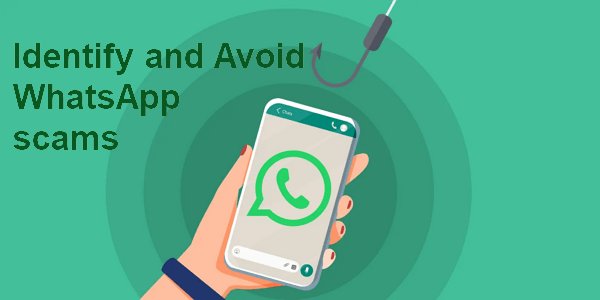Rising WhatsApp scams and how to identify them

WhatsApp is an international and centralized instant messaging platform, freely accessible to all. It also offers a voice-over-IP service and is owned by Meta. In short, it’s a one-solution-for-all kind of communication software, allowing its users to exchange messages, videos, images, contacts, locations, files, and other content with individuals and groups.
Additionally, it also enables video and voice calling, with features like “status updates” that let you post pictures for 24 hours, disappearing messages, processing payments, and more.
WhatsApp has over 2 billion users spread across 180+ countries. With its worldwide usage, it also brings in issues like security problems, hacks, and scams. And so the importance of WhatsApp Scams recovery arises here.
But, there’s no need to fret yet. This article aims to cover some of the most recurrent frauds on WhatsApp and how you can ideally identify them.
What are WhatsApp frauds?
When a cybercriminal reaches out to you as your friend, relative, or a popular business brand on WhatsApp, and requests money, it can be referred to as a WhatsApp fraud. While each scam is unique, pitching a distinct request to the target, they’re all looking for users’ personal details or money.
For a more in-depth understanding of how WhatsApp scams work, here are some of the top WhatsApp frauds reported in recent years.
The most common WhatsApp scams
- Impersonations of family members and relatives
Swindlers choose the most believable ways to fool people into sending them money. And what better way to trick someone than by making it look like a family member or relative is requesting financial aid?
One such frequent scam involves the impostor sending “Hi Dad, Hi Mom” messages, possibly from a hacked account or from an unknown number, making the recipient believe that they had to change their number. These family impostors make up scenarios wherein they’ve lost access to their bank account, forgotten their banking details, or need temporary financial help, which they’ll repay later.
For example, one such incident that occurred to a victim was when his parents were out on a trip and he felt they’d bought a new local number. Another imposter case involved an old parent who was scammed over a WhatsApp text that read that their child needed instant money as an emergency fund.
- Push payment fraud
Push payment fraud is a subset of WhatsApp impersonation scams. But the reason it’s dissected differently in this article is because these push payment frauds, also known as “broken phone” scams, are rising at a steady rate.
It is when a family member, relative, or friend texts you on WhatsApp from an anonymous number, sharing how they are tackling a broken phone situation, with no means to make an online payment. They may even suggest, directly or indirectly, that you pay their bills or other expenses to the account number they shared.
- WhatsApp Surveys & Cash Prizes
In recent years, there have been too many WhatsApp messages about cash prizes and surveys being circulated among its users. The ones who took part in these surveys were asked personal questions while titling the survey “WhatsApp Feedback or Experience.”
While users who signed up for cash prizes were asked to pay a nominal amount as an entrance fee, in the end, nobody won any cash prizes.
- Wrong-number scams on WhatsApp
WhatsApp wrong number frauds have been around for quite some time and frequently involve more subtle, lengthy social engineering techniques.
These WhatsApp scams generally start with a text from an unidentified number, present themselves or their business, and then reason that they entered the wrong number to clarify their message.
However, far from closing the conversation, scammers will ask you if you’d be interested in investing in their business. Additionally, they may ask for your name and where in the world you’re located.
How Can You Protect Yourself From This Scam? As a rule of thumb, if you’re contacted on WhatsApp by a number you don’t recognise, do not reply, and certainly do not provide personal information. A legitimate business won’t be searching for investors in casual WhatsApp chats.
How to spot WhatsApp scams
WhatsApp scams are increasingly challenging to spot if you don’t know exactly what to look out for since they are becoming more sophisticated. Fortunately, most fraudsters employ similar tactics, and understanding them can help you avoid becoming a victim.
Most WhatsApp scams involve messages that:
- Ask you to take immediate action. Fraudulent texts are often ominous, saying your accounts are blocked, or a government agency will take legal action against you.
- Includes grammatical errors. Texts from legitimate businesses (like banks) won’t contain any spelling mistakes. If you receive a text that has errors and encourages you to take action on a personal account or follow a link, it’s probably fake.
- Come from unknown numbers. Perform a quick Google search to ensure that the number from which the message was sent corresponds to who they claim to be. For example, you might find that the number is not associated with the company or agency that the text claims.
- Say you’ve won a random giveaway. Some WhatsApp spam messages claim you won a giveaway in which you did not participate. Then, they ask you to share personal information to claim your prize or click a link for more details.
- Includes unfamiliar links. Spammers can use links to hack your device or direct you to a malicious site designed to steal your information. Beware of links from numbers you don’t recognise or that take you to sites you’ve never visited before. Some links may appear familiar, but upon closer inspection, they may contain spelling errors and extra letters or numbers.
- Are sent from an unusually long phone number. Receiving an offer from an unidentified 11-digit number may lead to a scam. Six-digit or SMS short codes are phone numbers used to send marketing texts.
Conclusion:
Some scammers might also call you through WhatsApp, which is rare. In this case, please inquire as to which institution they represent. Then, contact the company or agency to verify what the callers told you. Finally, if the caller threatens you with the safety of a loved one, call your loved one directly to ensure they’re safe.






